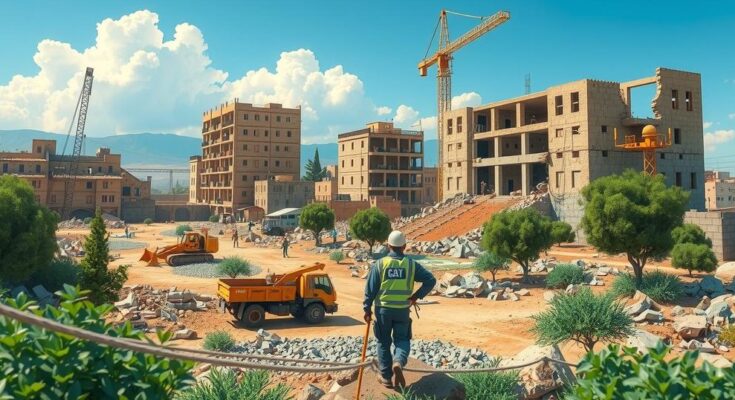The Weiser Diplomacy Center hosted a talk on Syria’s post-civil war reconstruction featuring Qutaiba Idlbi and Dr. Abdalmajid Katranji. They discussed the devastation caused by the civil war, the transition in leadership, and the establishment of self-governing institutions in Syria. The importance of alleviating U.S. sanctions and fostering civic engagement in reconstruction efforts was emphasized, alongside the hope and resilience of the Syrian people.
The Weiser Diplomacy Center at the University of Michigan recently hosted a talk featuring Qutaiba Idlbi, a senior fellow with the Atlantic Council, and Dr. Abdalmajid Katranji, an adjunct faculty member from Michigan State University. They discussed the challenges of reconstructing Syria after fourteen years of civil war. The presentation addressed the past devastation, current strategies of the new Syrian government, and the critical obstacles faced as the country moves towards rebuilding.
On December 8, 2024, the regime of President Bashar al-Assad collapsed after a prolonged stalemate in the civil war, resulting in Ahmed al-Sharaa taking leadership. Sharaa, who leads the group Hay’at Tahrir al-Sham from Idlib, has received criticism for his historical ties to Al-Qaeda, although Idlbi and Katranji assert that he has severed those links and actively combats both Al-Qaeda and ISIS.
Idlbi emphasized the extensive damage inflicted on Syria due to the civil war, highlighting the brain drain that has occurred as educated professionals have fled the country. He noted, “There’s a lot for Syrians to rebuild; half of Syria has left the country. So I think this is one of the biggest brain drains that we’ve seen since World War II. The displacement of Syrians is the biggest since World War II.”
Despite such devastation, Idlbi conveyed a sense of optimism among Syrians, who are grateful for liberation from the oppressive regime. He stated, “You can feel the hunger or see the hunger on people’s faces, but you can also see the smiles and the joy on their faces that they are finally free.”
Katranji recounted his experiences providing humanitarian aid in both Assad-controlled areas and those governed by HTS. He contrasted their governance structures, praising Idlib for establishing civic institutions conducive to reconstruction. He remarked, “There was structure, there was institutions, and that’s what’s critical to understand. There wasn’t this idea of the warlord or the political boss.”
In stark contrast, while delivering aid in areas under Assad’s regime, Katranji noted a lack of organization and excessive bureaucratic hurdles. He reflected, “There was no structure, and we were still rescuing people trapped underneath the building, because there was no civil brigade.”
Idlbi opined that, despite the suffering caused by the civil war, it allowed Syrians the opportunity to cultivate self-governing institutions, differing from the U.S. occupation of Iraq. He said, “In Syria there was that gap where Syrians were able to come together. They already started nation building; we’re not coming in to set up systems.”
Idlbi also called for continued U.S. engagement in Syria’s reconstruction, asserting, “I do believe in a good American role across the world. We can’t really escape who we are: We’re the empire of this era…They have built the Syrian Dream, which I believe is very similar to the American Dream.”
Katranji criticized the ongoing U.S. sanctions under the Caesar Syria Civilian Protection Act, suggesting that such measures hinder progress in the newly established political environment. He warned, “If you wait too long, then another vacuum will be created, somebody else will step in.”
In closing, Katranji urged for the removal of sanctions, emphasizing the necessity for swift international agreement to support Syrian reconstruction efforts. He mentioned, “The next three months are absolutely critical…globally, the European Union has already relaxed sanctions, the United Nations has already said ‘relax sanctions.’”
Student Razaan Killawi, co-president of Students Organize for Syria, praised the event and encouraged her peers to engage with ground-level reporting regarding Syria. She noted, “I think it’s really meaningful when (students) can come to events led by Syrians…to learn from them and see what is actually happening,” highlighting the importance of accurate information in the context of prevalent disinformation.
The discussion led by Qutaiba Idlbi and Dr. Abdalmajid Katranji emphasized the multi-faceted challenges of reconstructing Syria post-civil war. They highlighted the significant brain drain, the resilience of the Syrian people, and the evolving governance in the wake of Assad’s regime. Furthermore, they advocated for a constructive U.S. role in supporting Syria while criticizing the lasting effects of sanctions. The necessity for humanitarian aid, civic engagement, and genuine understanding of the situation in Syria remains crucial as the nation embarks on the path to recovery.
Original Source: www.michigandaily.com




